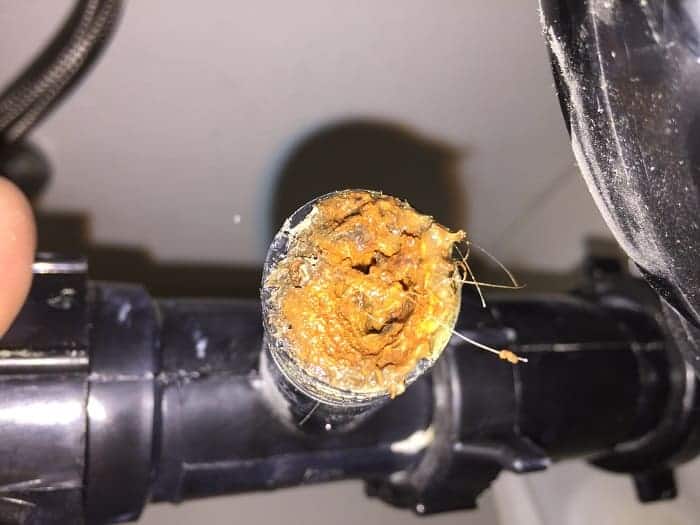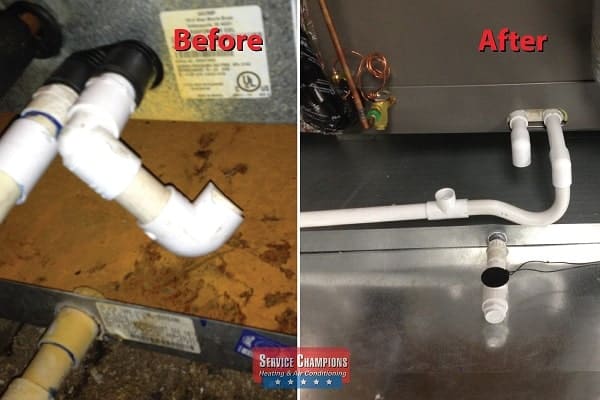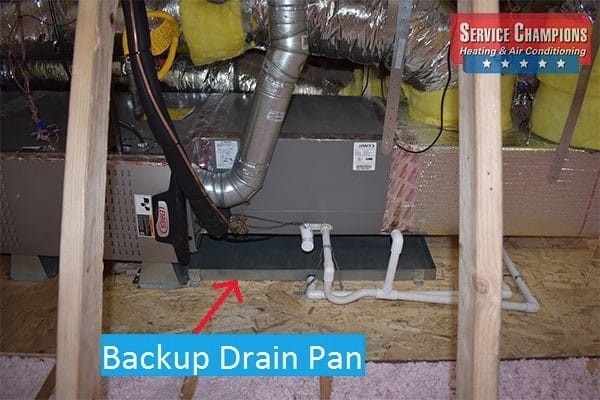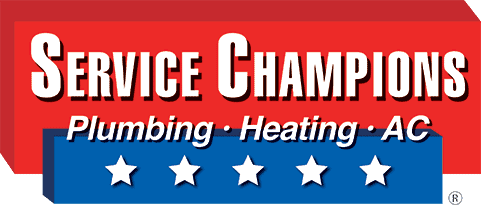Why Is the Air Conditioner Leaking Water?
Water itself is harmless. However, water that pools, stagnates or collects around the air conditioner causes more than a simple inconvenience. Water leaking from air conditioners causes all kinds of trouble.
An air conditioner leaking water can damage:
- Attic floors
- Home walls and floors
- Insulation
- Indoor air quality
- Energy efficiency
- General HVAC safety
- Air conditioner performance
Water collecting in dark and warm areas also creates microbiological growth, polluting the indoor air.
Can homeowners avoid water from their air conditioners? No. Water always results from air conditioning. Can homeowners help air conditioner leaking water? Yes.
Why Does an Air Conditioner Make Water?
Inside the central air system is a box of coils called the evaporator coils. It sits on top of the furnace. When the thermostat is on for cold air, the evaporator coils drop to very low temperatures from condensed refrigerant. Warm air passes over the coils. Heat is removed from this air. Then, the air that has been cooled moves into the house. As the heat transfer takes place, so does condensation. Water collects with every air conditioning cycle.
Unless homeowners do not use their air conditioners, they will always make water. However, there are many solutions in place to remove water. If these solutions are in good shape, no one should find their air conditioner leaking water.
Where is the Air Conditioner Leaking Water?
Generally, there are four different locations within the central air system where air conditioner leaking water happens most.
These areas include the:
- Condensate drain line
- Condensate pump
- Evaporator coils drain pan
- Refrigerant
In addition, homeowners who want to restore an air conditioner leaking water need to also figure out what type of installation it is. Horizontal installations mean that the furnace lies on its side. These are typical for homes with furnaces installed in the attic. Vertical installations have furnaces standing upright, usually in the garage or in a furnace closet.
Homeowners should also understand that natural wear and tear results in the air conditioner leaking water. The central air system altogether is the most diligent equipment in the house. It works all hours of the day throughout the majority of the year. Parts of the central air system are also exposed to natural elements, including extreme outdoor temperatures. It is both common and expected that the central air system takes a beating.
This type of wear and tear results in:
- Broken wires
- Cracked drain pans
- Fractured pipes
- Clogs and buildup
All of these changes and damages contribute to the air conditioner leaking water.
Air Conditioner Leaking Water Because of the Condensate Drain Line
The condensate drain line is the primary line that is used to remove water collection from the central air system. The drain line itself is made of PVC and is directly connected to the evaporator coils. It is also sloped to help lead water out to an external location.
When the condensate drain line is compromised, air conditioner leaking water is very likely. Specifically, there are two reasons that a condensate drain line contributes to air conditioner leaking water.

Clogged condensate line – A/C Broken
First, the condensate drain line can clog. Clogs occur because of a poor quality air filter or lack of maintenance. Essentially, particles pass through the primary air filter and into the air conditioner system. Then, they stick to the evaporator coils as air flows over them. The pieces that get stuck are also washed out as the temperature warms. As water collects and enters the condensate drain line, the pieces build up into a clog, blocking drainage. As a result, water back ups the drain line and eventually leaks in different directions.
Second, the condensate drain line can break or disconnect from the evaporator coils. This results in the air conditioner leaking water. When this happens, water spills everywhere because there is no way for it to safely leave the area.
In general, homeowners with the horizontal installation experience little damage. This is because air conditioner leaking water never reaches the inner walls of the home. However, those with vertical installation may discover soggy attics or water damage and stains on the ceiling.
Air Conditioner Leaking Water Because of the Condensate Pump
The condensate pump is a device installed to support water removal in the central air system. Condensate pumps are more common in homes with attic or horizontal furnace installation, which is popular in townhomes where either sidewall is shared with another building.
This works for a couple reasons. First, condensate drain lines need to cut through to an exterior wall. In a townhome, the furnace is fitted into the attic. This means that the condensate drain line is longer, having to cover more distance to find an external wall. For that reason, the condensate pump helps push and move water from drain pans to drain lines. Second, in the event that there is an overflow of water, the pump helps collect and remove excess water.
Unfortunately, the condensate pump can contribute to an air conditioner leaking water.
The condensate pump can fail. When it stops working, water collects without removal. As a result, water spills out from the pan, leaking through the roof, walls and other surrounding areas.

Old Drain Pan On Left – New Metal Drain Pan On Right
The condensate pump pan can also crack. This drain pan is put in place to catch water. It is from this pan that water is pumped out. With time, however, these pans can crack. Because these pans are made of plastic, in the intense heat of the attic and furnace, the materials lose moisture. In the end, the pan cracks and leaks water.
The tubing of the condensate pump can also break or crack resulting in air conditioner leaking water. The tubing is made of vinyl and copper, both of which can dry out or corrode, leading to leaks.
These damages are all natural and normal to the central air system. Over decades of time, use and wear, parts absorb shock and change.
In order to facilitate safe operation, there is a safety drain switch in place. If the condensate pump fills to capacity without emptying of water, a switch is tripped that turns off the air conditioner. While the furnace may still cycle, air conditioning to cool will be off, stopping water production.
Air Conditioner Leaking Water Because of the Evaporator Coil Drain Pan
The evaporator coils are a key part of the central air system. As mentioned before, these coils sit on top of the furnace and drop to cold temperatures in order to cool room temperature air to the desired level set on the thermostat. With the air conditioner cycling on and off throughout the day, water collects via condensation. For this reason there is a drain pan in place specifically for water from the evaporator coils.

Backup Drain Pan
In a horizontal system, there are two pans installed. One goes beneath the coils as with a vertical system. The second drain pan is placed under the entire unit as a backup drain pan. Like the pans for condensate pumps, these pans are also plastic and wear down over long periods of time.
In the wintertime, these drain pans are in the center of the action, enduring 120 to 150 degree air regularly throughout the day. Pans lose moisture and break. As with all pans, once a break happens, water spills out and homeowners find the air conditioner leaking water.
Most of the time, damaged drain pans cannot be replaced as a part. Because the drain pan is connected to the evaporator coil system, the entire system would need repair.
Some homeowners want to use liquid rubber sealants to mend cracks and fractures. However this is not the recommended way to repair the air conditioner leaking water. Liquid rubber sealants are likely to peel and cause more problems overall.
Air Conditioner Leaking Water Because of the Refrigerant
The central air system is composed of two distinct units. There is the furnace inside the house, either in the furnace closet or in the attic. Then, there is the condenser unit outside the home, usually located in the backyard or patio. When refrigerant is activated, the evaporator coils on the furnace get very cold. Meanwhile, the condenser unit gets very hot as it works to remove heat from indoor air. Within the overall temperature shifts that happen with each air conditioning cycle, condensation happens, once again. However, if there isn’t enough refrigerant, the evaporator coils and the rest of the indoor unit grow unusually cold. It sounds counterintuitive, but it happens more often than homeowners expect.
The best way to understand this is by comparing it to hose water. Water in the hose is liquid, but as it exits through the spray nozzle it turns into a fine mist. As that mist evaporates, it also drops in temperature. In the same way, when the AC system works on little refrigerant, the interior grows unusually cold. Without enough heat in the airflow to balance the heat transfer, the coils freeze. Water collects over the evaporator coils and freezes in layers. After some time, the evaporator coils turn into a block of ice.
Frozen evaporator coils also result from a dirty air filter. With a full filter, particles pass through into the AC system. They stick onto the evaporator coils and collect in layers while absorbing water.
Eventually, the AC system turns off. When it does, the ice begins to melt. However, the drain pan is designed to handle normal amounts of water from normal HVAC operation. With an ice block melting into the drain pan, air conditioner leaking water is bound to happen.
Fix Your Air Conditioner Leaking Water with Service Champions
Service Champions Heating & Air Conditioning has serviced thousands of homes in Southern California. We are the leading HVAC providers for homeowners wanting superior care for AC systems. We are also the only Diamond Certified AC specialists for Orange and Los Angeles Counties.
Homeowners count on our genuine customer service and expert technical care to deliver the best of home comfort through heating and air conditioning.
Fix your air conditioner leaking water with our preferred HVAC specialists. Select Service Champions. Complete the form below or speak to our friendly call center representatives for more information.
Schedule Service
Oops! We could not locate your form.

